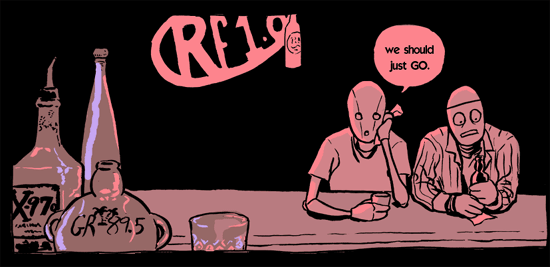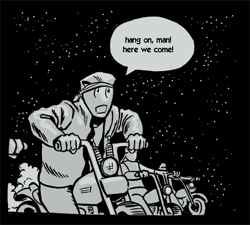Alexander Danner reviews Nine Planets Without Intelligent Life by Adam Reed.
"The future is easy. Just take your own personal variables, factor in the external variables, crunch a few numbers, and there ya go." – Female Form Robot, Luca
Really, it's not so surprising that humanity has died out, intent on our own annihilation as we seem to be. What's surprising is simply how — not in a flash of nuclear war, but rather in a pleasant stupor of fatty foods and affordable sex. With the invention of convincing artificial intelligence comes the development of some very talented and eternally attractive sex robots. Humanity loses sexual interest in itself, the birth rate drops to zero, and the last man dies fat and happy, amidst the tender affections of his burnished chrome harem. Not to worry though: humanity lives on (sort of), perfectly simulated by its former servants, who now have the run of the solar system. Sure, they're more durable than actual humans, but beyond that, not much has changed.
This is the world of Nine Planets Without Intelligent Life, Adam Reed's existential road story in space. Chris and Ben are a pair of blue collar robots working in a Mercurian factory, where they build other assembly robots like themselves — that is, until they discover they're being replaced by a new model. Thanks to the black market bohemian drive circuits they picked up during a drunken weekend, they decide against turning themselves in for disassembly, which would be the natural order of things. Instead they take off on an adventure through the solar system, traveling planet-to-planet seeing what they can see. And, of course, hitting every bar along the way.

Chris is the introspective one (which is to say, he's rather self-absorbed), who sets the whole journey in motion as a way of finding himself and seeking out his future. "What if you don't know your own variables?" Chris asks Luca, a friend he makes while on Venus. "How do you find out something like that?" Like most young people with dead-end jobs and no career prospects, Chris is a bundle of existential angst. (And yes, he does read as a young person, despite the symbolism of his being replaced by a newer model at the factory. Just one of the perks of being a robot, perhaps – you can play any age.)
Ben, on the other hand, is a gregarious alcoholic (which is to say, he's also rather self absorbed) who views the trip as an interplanetary bar crawl. Chris may be the one on a voyage of discovery, but Ben's more likely to dive into an adventure, whether that means installing an illicit erogenous zone circuit on Venus or attempting to live out an action movie on Mars.
The artwork is simple, but expressive – basic outline cartoon drawings that could stand as well in black and white as they do in color. As such, Reed's limited use of color is particularly effective – each panel is rendered with only one or two colors, giving the images depth, but not realism. (A former instructor of Reed's described the comic as black and white with tones, rather than a true color comic.) This scheme helps to remind us that no matter how fully developed the characters seem, we're not looking at real people, but mere simulations.

The story is arranged into episodic chapters, each planet providing a distinct adventure, with occasional diversions to places such as the asteroid belt and Earth's moon. Taken together, it's a tour of human history, with each adventure delving into some foible of human society. The symbolism isn't overcomplicated – Venus presents the naive confusion and sleazy indulgences of sex and love. (In the future, the most popular sex workers will still be amorphous blobs of silicon.) Earth is a museum of humanity's cultural and artistic achievements, and continues to be home to robot-kind's creative minds. Mars presents the nonsensical aggressions of unending war, where even apartment hunting involves military action. True to its structural device, the story will be limited in duration; Reed has stated that it will end on page 99, just a little beyond Pluto. As of this writing, the story is ten pages past its halfway point, with Chris and Ben exploring Jupiter.
That the story is working toward a planned ending is an important point. Protracted over too long a duration, the characters' introspective angst could easily devolve into whiny angst. Chris has already shown a tendency in this direction, such as when he went on a petulant drinking binge on Earth, after his favorite author befriended Ben instead of him. But having an end in sight gives a much stronger sense that Reed is going somewhere with these characters; their future isn't open-ended. They have definite arcs that will come to definite conclusions, and these low points are worthwhile steps along the way. As a result, their journey is all the more meaningful and satisfying.
Recent Comments